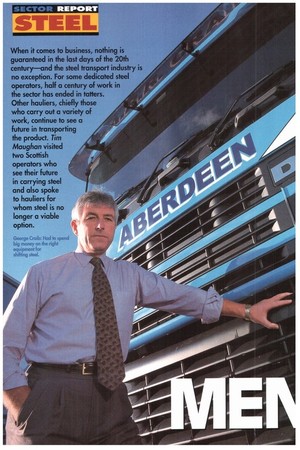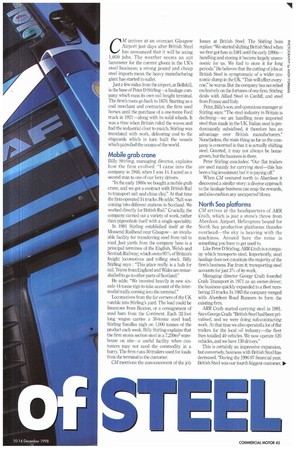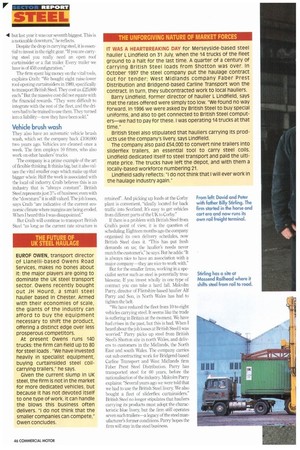When it comes to business, nothing is guaranteed in the
Page 46

Page 47

Page 48

If you've noticed an error in this article please click here to report it so we can fix it.
last days of the 20th century—and the steel transport industry is no exception. For some dedicated steel operators, half a century of work in the sector has ended in tatters. Other hauliers, chiefly those who carry out a variety of work, continue to see a future in transporting the product. Tim Maughan visited Iwo Scottish operators who see their future in carrying steel and also spoke to hauliers for whom steel is no longer a viable option.
George Craib: Had to spend big money on the right equipment for shrfhng steel. CM arrives at an overcast Glasgow Airport just days after British Steel has announced that it will be axing 1,600 jobs. The weather seems an apt barometer for the current gloom in the UK's steel business; a strong pound and cheap steel imports mean the heavy manufacturing giant has started to suffer.
Just a few miles from the airport, at Bel!shill, is the base of Peter D Stirling—a haulage company which runs its own rail freight terminal. The firm's roots go back to 1870. Starting as a coal merchant and contractor, the firm used horses until the purchase of a one-tonne Ford truck in 1921—along with its solid wheels. It was a time when Britain ruled the waves and had the industrial clout to match. Stirling was inundated with work, delivering coal to the shipyards which in turn built the vessels which patrolled the oceans of the world.
Mobile grab crane
Billy Stirling, managing director, explains how the firm evolved: "I came into the company in 1946, when I was 14. I acted as a second man to one of our lorry drivers.
"In the early 1960s we bought a mobile grab crane, and we got a contract with British Rail to transport salt and china clay" At that time the firm operated 14 trucks. He adds: "Salt was coming into different stations in Scotland. We worked directly for British Rail." Crucially, the company carried out a variety of work, rather than pigeonhole itself with a single speciality In 1981 Stirling established itself at the Mossend Railhead near Glasgow—an invaluable facility for transferring steel from rail to road. Just yards from the company base is a principal terminus of the English, Welsh and Scottish Railway; which owns 95% of Britain's freight locomotives and rolling stock. Billy Stirling says : "This place really is a hub for rail. Trains from England and Wales are remarshalled to go to other parts of Scotland."
He adds: "We invested heavily in new sixaxle 44-tonne rigs to take account of the intermodal traffic coming into the terminal."
Locomotives from the far corners of the UK rumble into Stirling's yard. The load could be limestone from Buxton, or a consignment of steel bars from the Continent. Each 32-foot long wagon carries a 30-tonne steel load; Stirling handles nigh on 1,000 tonnes of the product each week. Billy Stirling explains that the firm stores section steel in a 7,250m2 warehouse on site—a useful facility when customers may not need the commodity in a hurry. The firm runs 50 trailers used for loads from the terminal to the customer.
CM mentions the announcement of the job losses at British Steel. The Stirling boss replies: "Vie started shifting British Steel when we first got here in 1981 until the early 1990s— handling and storing it became largely uneconomic for us. We had to store it for long periods." He believes that the cutting of jobs at British Steel is symptomatic of a wider economic slump in the UK. "This will affect everyone," he warns. But the company has not relied exclusively on the fortunes of one firm. Stirling deals with Allied Steel in Cardiff, and steel from France and Italy.
Peter, Billy's son, and operations manager at Stirling says "The steel industry in Britain is declining—we are handling more imported steel than made in the UK. Italian steel is predominantly subsidised, it therefore has an advantage over British manufacturers." Nonetheless, the main thing as far as the company is concerned is that it is actually shifting steel. Granted, it may not always be homegrown, but the business is there.
Peter Stirling concludes: "Our flat trailers are used mainly for carrying steel—this has been a big investment but it is paying off."
When CM ventured north to Aberdeen it discovered a similar story: a diverse approach to the haulage business can reap the rewards, and also cushion any unexpected blows.
North Sea platforms
CM arrives at the headquarters of ARR Craib, which is just a stone's throw from Aberdeen Airport. Helicopters bound for North Sea production platforms thunder overhead—the sky is heaving with the machines. Around here the noise is something you have to get used to.
Like Peter D Stirling, ARR Craib is a company which transports steel. Importantly, steel haulage does not constitute the majority of the firm's business. Far from it; transporting steel accounts for just 3% of its work.
Managing director George Craib founded Craib Transport in 1971 as an owner-driver; the business quickly expanded to a fleet numbering 15 trucks. In 1983 the company merged with Aberdeen Road Runners to form the existing firm.
ARR Craib started carrying steel in 1991. Says George Craib: "British Steel had been privatised, and we were doing sub-contracting work. At that time we also operated a lot of flat trailers for the local oil industry—the fleet then totalled 40 vehicles. We now operate 120 vehicles, and we have 130 drivers."
This is certainly an impressive expansion, but conversely, business with British Steel has decreased. "During the 1996-97 financial year, British Steel was our fourth biggest customer, P.
11 but last year it was our seventh biggest. This is a noticeable downturn," he reflects
Despite the drop in carrying steel, it is essential to invest in the right gear. "If you are carrying steel you really need an open roof curtainsider or a flat trailer. Every trailer we have is of 45ft configuration."
The firm spent big money on the vital tools, explains Craib: "We bought eight raise-lower roof opening curta insiders in 1989, specifically to transport British Steel. They cast us £25,000 each." But the massive cost did not equate with the financial rewards. "They were difficult to integrate with the rest of the fleet, and the drivers had to be trained to use them. They turned into a liability—now they have been sold."
Vehicle brush wash
They also have an automatic vehicle brush wash, which set the company back 4;100,000 two years ago. Vehicles are cleaned once a week. The firm employs 10 fitters, who also work on other hauliers' trucks.
The company is a prime example of the art of flexible thinking. It thinks big, but it also values the vital smaller cogs which make up that bigger whole. Half the work is associated with the local oil industry Craib believes this is an industry that is "always constant". British Steel represents just 3% of business; even with the "downturn" it is still valued. The job losses, says Craib "are indicative of the current economic climate where margins are being eroded. When I heard this! was disappointed" But Craib will continue to transport British Steel "as long as the current rate structure is retained". And picking up loads at the Corby plant is convenient. "ideally located for back traffic into Scotland. It's easy to get vehicles from different parts of the UK to Corby."
If there is a problem with British Steel from Craib's point of view, it is the question of scheduling. Eighteen months ago the company organised its own delivery schedules, now British Steel does it. "This has put fresh demands on us; the haulier's needs never match the customer's," he says. But he adds: "It is always nice to have an association with a major company—they are nice to work with."
But for the smaller firms, working in a specialist sector such as steel is potentially troublesome. If you invest wholly in one type of contract you can take a hard fall. Malcolm Parry, director of Flintshire-based haulier All Parry and Son, in North Wales has had to tighten the belt.
"We have reduced the fleet from 10 to eight vehicles carrying steel. It seems like the trade is suffering in Britain at the moment. We have had crises in the past, but this is bad. When I heard about the job losses at British Steel I was worried." Parry picks up steel from British Steel's Shotton site in north Wales, and delivers to customers in the Midlands, the North East and south Wales. The company carries out sub contracting work for Bridgend-based Carline Transport and West Midlands firm Faber Prest Steel Distribution. Parry has transported steel for 60 years, before the nationalisation of the industry. Malcolm Parry explains: "Several years ago we were told that we had to use the British Steel livery. We also bought a fleet of sliderflex curtainsiders." British Steel no longer stipulates that hauliers carrying its pmducts must adopt the characteristic blue livery, but the firm still operates seven such trailers—a legacy of the steel manufacturer's former conditions. Parry hopes the firm will stay in the steel business.
THE UNFORGIVING NATURE OF MARKET FORCES IT WAS A HEARTBREAKING DAY for Merseyside-based steel haulier L Lindfield on 31 July, when the 14 trucks of the fleet ground to a halt for the last time. A quarter of a century of carrying British Steel loads from Shotton was over. In October 1997 the steel company put the haulage contract out for tender; West Midlands company Faber Prest Distribution and Bridgend-based Carline Transport won the contract. In turn, they subcontracted work to local hauliers.
Barry Lindfield, former director of haulier L Lindfield, says that the rates offered were simply too low. "We found no way forward. In 1996 we were asked by British Steel to buy special uniforms, and also to get connected to British Steel computers—we had to pay for these. I was operating 14 trucks at that time."
British Steel also stipulated that hauliers carrying its products use the company's livery, says Lindfield.
The company also paid £54,000 to convert nine trailers into sliderflex trailers, an essential tool to carry steel coils. Lindfield dedicated itself to steel transport and paid the ultimate price. The trucks have left the depot, and with them a locally-based workforce numbering 21.
Lindfield sadly reflects: "I do not think that I will ever work in the haulage industry again."
THE FUTURE OF UK STEEL HAULAGE EUROF OWEN, transport director of Llanelli-based Owens Road Services, makes no bones about It: the major players are going to dominate the UK steel transport sector. Owens recently bought out JH Hourd, a small steel haulier based in Chester. Armed with their economies of scale, the giants of the industry can afford to buy the equipment necessary to shift the product, offering a distinct edge over less prosperous competitors.
At present Owens runs 140 trucks: the firm can field up to 80 for steel loads. "We have invested heavily in specialist equipment, buying curtainsided steel coilcarrying trailers," he says.
Given the current slump In UK steel, the firm is not in the market for more dedicated vehicles, but because it has not devoted itself to one type of work, it can handle the blows this business often delivers. "I do not think that the smaller companies can compete," Owen concludes.












































































































